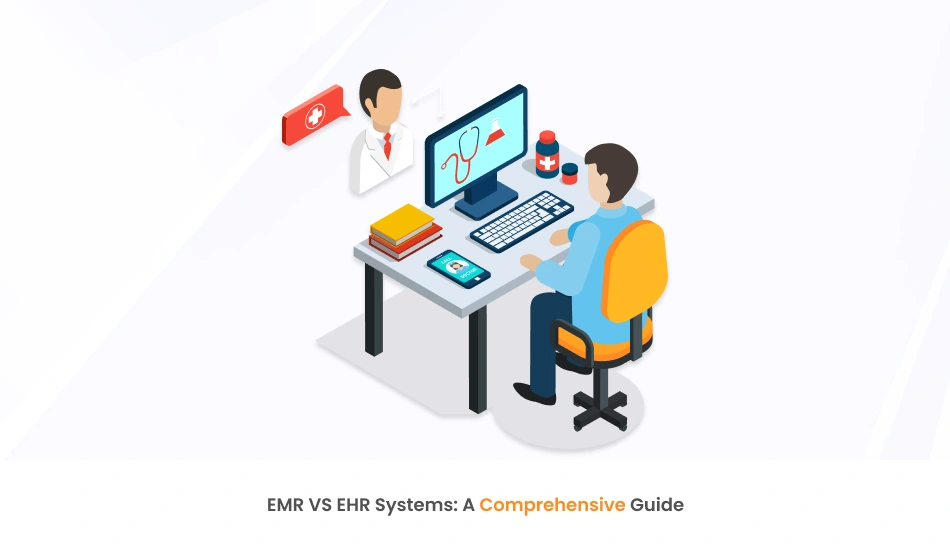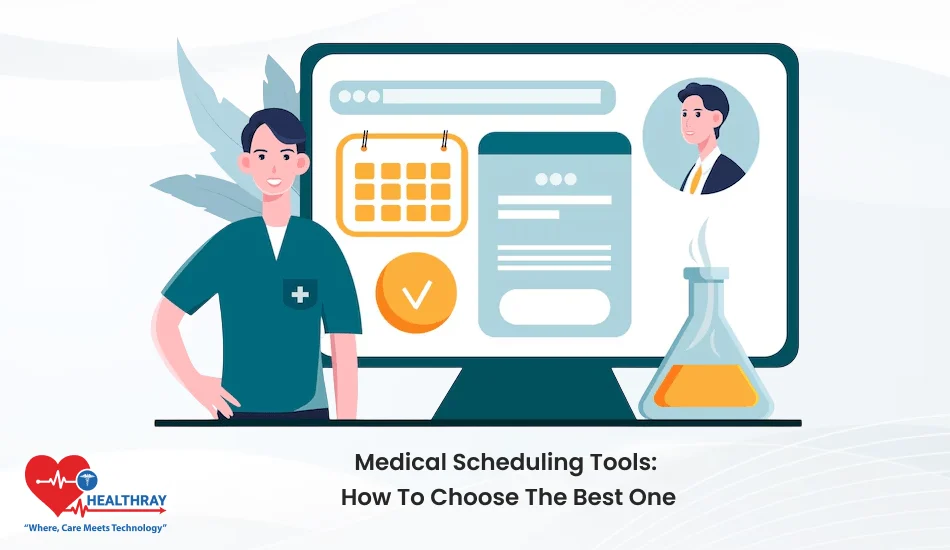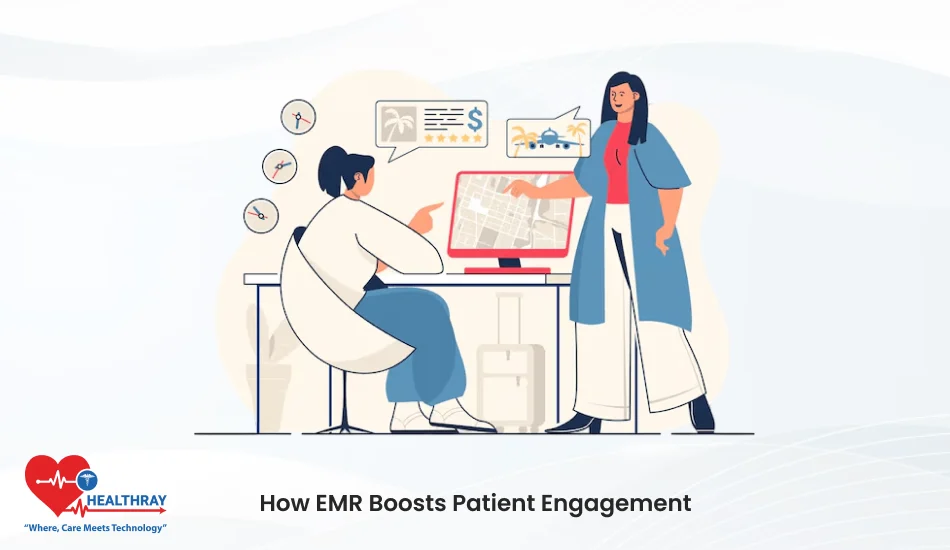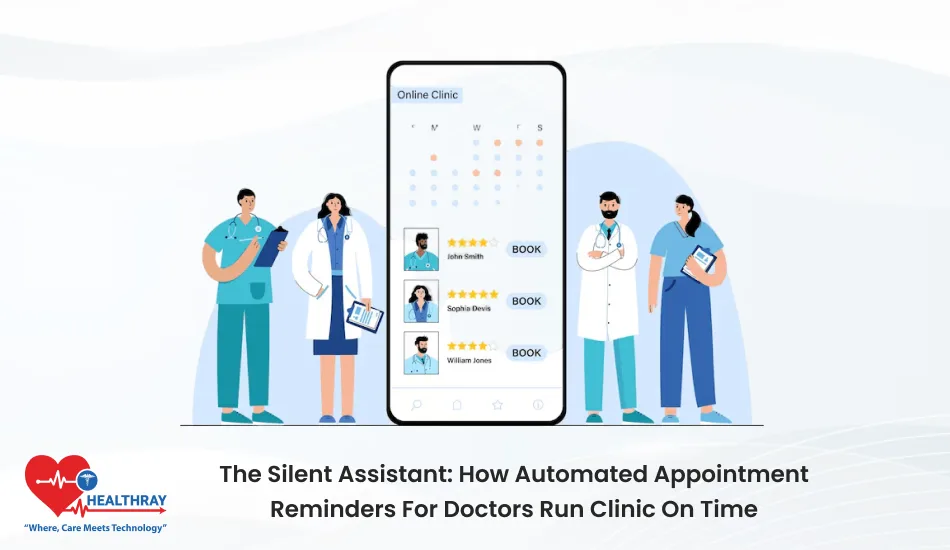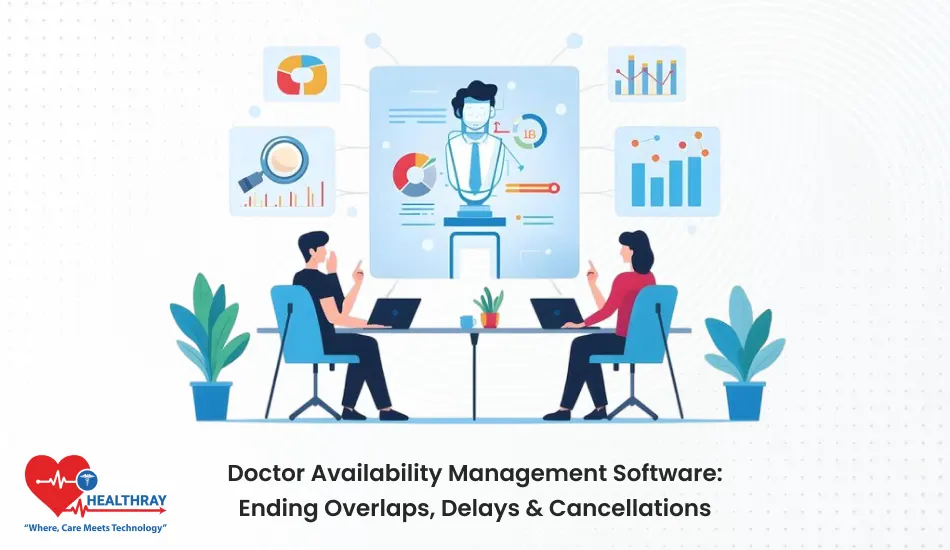Quick Summary
EMR v/s EHR systems have a huge difference in terms of features and components. Moreover, the primary similarity between the two of them is the electronic health platform. Furthermore, EHR has the ability to capture extensive records. On the other hand, EMR does not have enough databases to record innumerable items of different branches. To know more, draw your attention on this page.
Introduction
There is no dilemma that an electronic record system is necessary for each medical organization or crucial for every solo practitioner. However, there is always a confusion between EMR and EHR Software. Moreover, there are numerous thoughts roaming in mind regarding their components and features.
The common question which may arise in everyone’s mind is what is the difference between electronic medical record and electronic health record. Furthermore, EMR v/s EHR systems have a lot of differences, which assists you to choose the suitable one.
Electronic medical records have been administered by one provider, there is no necessity of multiple persons to manage it. On the other hand, electronic health records can be managed by several providers as it is too difficult to manage with a single person.
What is the use of EMR and EHR?
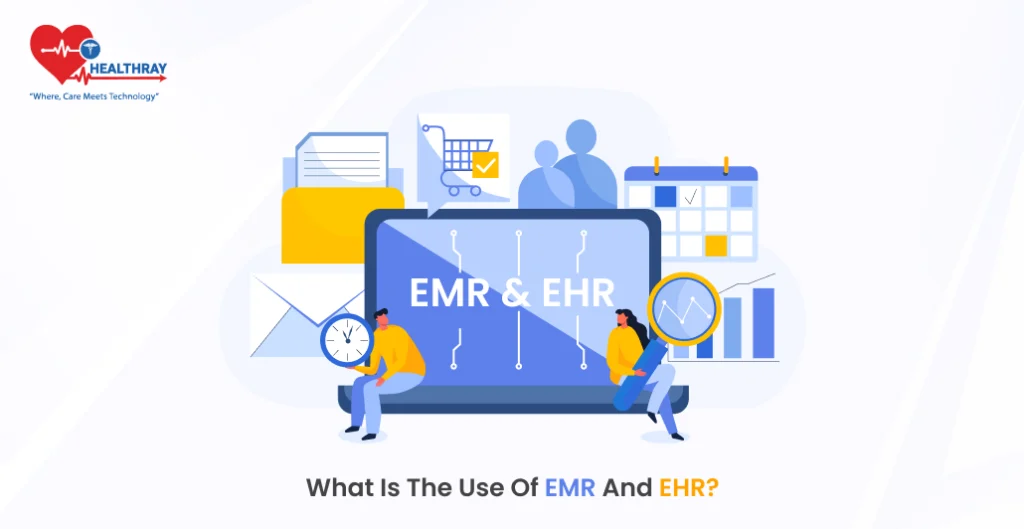
Are you fed up with assimilating paper records? Want an advanced system in your healthcare organization? Then, EMR and EHR is for you. Choose wisely as per your requirements. Moreover, these both are leading one to minimize personnel workload and accurate patient diagnosis.
These software have versatile advantages, which propel you to acquire these health platforms. Furthermore, the benefits are facilitating precision in maintaining health information, data can be transferred to other physicians with the prior consent of the patient, and decreases administrative expenses.
This is helpful for improving medical practice and advancing employee skills. Moreover, EMR v/s EHR systems can easily administer personal health records, eliminate paper charts, patient monitoring, can share patient data at whatever time, assigning tasks across departments, and online health documentation.
Distinguish between EHR vs EMR
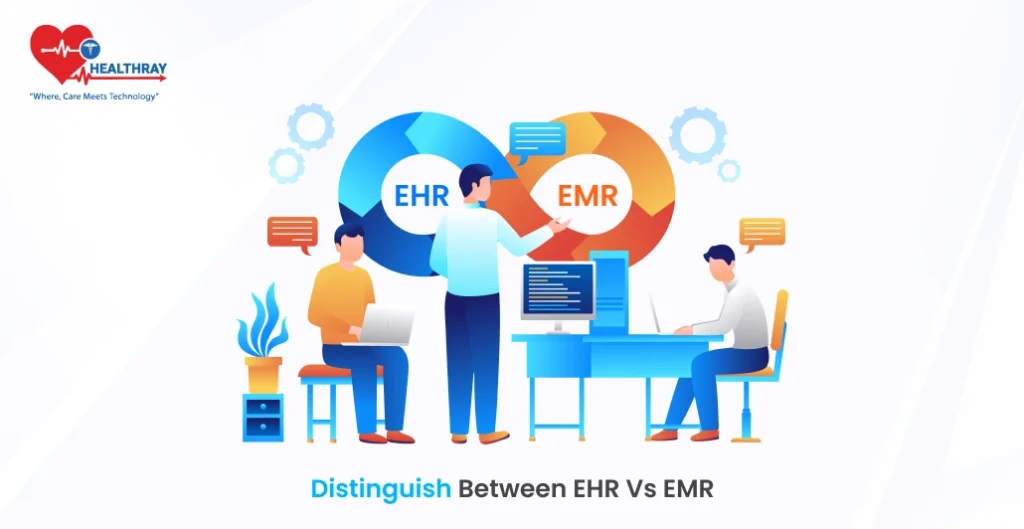
The primary difference is seen in their full form as EMR stands for electronic medical record and EHR stands for electronic health records. Moreover, the way of record keeping is different in these two platforms. EMR stores limited information whereas, EHR records exhaustive information. Need to learn more about the EMR v/s EHR systems, look below :
Record management system
A big size of cabinet no longer assists to record a multiple of clinical documents. Therefore, it needs the best reliable system like the EHR software. An ultimate data capturing and securing medical platform that improves clinical efficiency, preserves time on digging files, streamlines to draft healthcare documents, administers revenue documents, seamlessly exchanges clinical information, and aids to clinical guidelines.
Electronic health record system integrates with a master database that can manage gigantic information of various branches and can effortlessly handle each healthcare segment without any barrier and massive efforts. Therefore, EHR software can provide remote communication to other branches and the premier one for those healthcare organizations which have many branches.
On the other hand, electronic medical record systems can record limited information. Similarly, maintain only single hospital data and can’t manage multiple branches of the same hospital. It can’t help you to communicate with other branch employees on account of its limited functionality. Therefore, EMR software is not used where it has a variety of segments and multiple branches.
Suitability
An electronic medical record is no doubt suitable for small clinics, single branch hospitals, and sole healthcare practitioners. Moreover, it is less costly than electronic health record software. It is just a replacement of paper records not considered the whole modification of healthcare workflow.
On the contrary, electronic health records have coverage from a patient’s medical history to each employee information. Moreover, it helps to maintain unexpurgated information in the best possible way and aids to update medical records continuously. Consequently, the electronic health record software (EHR Software) is top-tier for multidisciplinary practices.
Historical data
EMR v/s EHR systems have the main difference in piling up historical records and another doubt is arising from this statement that the EMR system also has a feature to record historical information. Moreover, EMR has a vast ability to record medical histories but not that of the EHR software. Also, it includes various records such as lab results, duplicate tests, test results, patient’s record, and other health related information.
Electronic health records can capture a multitude of information such as patient portals inclusive of patient’s medical information, treatment history, and entered up-to-date information. Furthermore, it saves radiology reports, hospital missions, each branch information and complete information of medical inventories. Therefore, it enhances patient’s care
Reports
This difference is not for all electronic medical record software, but some of the EMR software has limited functionality. Therefore, they can generate basic medical reports. On the contrary, electronic health records create intuitive reports and EMR systems are merely a substitution of a paper chart. EMR v/s EHR systems both are valuable tools but as per the individual requirement. The major advantages of intuitive health reports are :
- Enhancing decision making ability
- Concise information in best presentable manner
- Ease to make hospital strategies
- Formulating KPI goals
- Analyze overall productivity of healthcare organizations.
Step towards digital era with our healthcare solution
Revamp your hospital facilities and embrace change for better healthcare management. Ease in managing and organizing large medical datasets leads to effective analysis. Seize the opportunity now!
Interoperability
Electronic health records can connect with myriad health systems such as laboratory information systems, accountancy departments, operational management departments, nursing departments, and surgical departments. Furthermore, the other segments include the pharmaceutical department, emergency department, and patient care department.
Apart from it, there are various segments which are interlinked with electronic health record (EHR) systems. It helps to share medical information and aids to provide access to any physician after the patient’s approval. Moreover, it helps in effective decisions from health insights and recorded medical information.
Benefits of the Electronic Medical Record (EMR Software) and the Electronic Health Record (EHR Software)
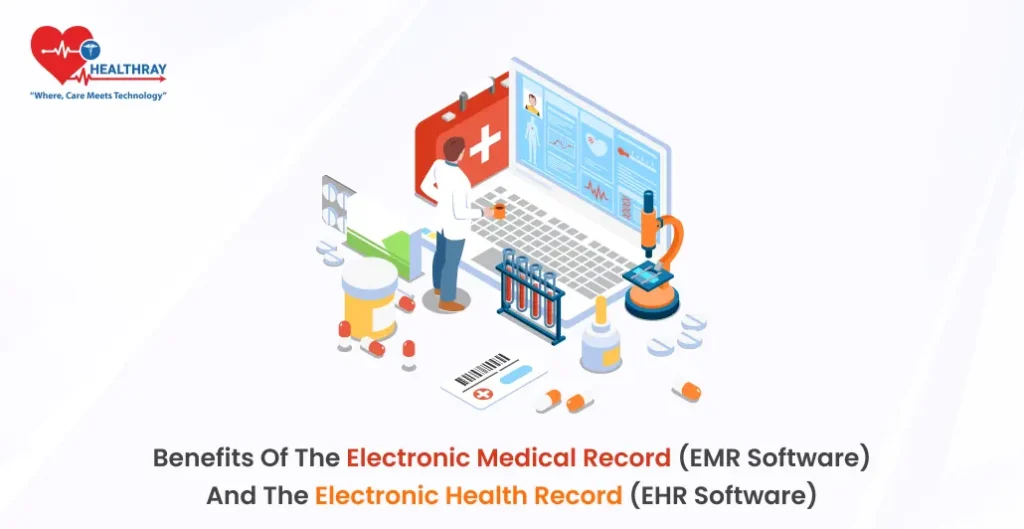
Implement EMR and EHR for enhancing patient contentment, maximize productivity, and increase health efficiency. Moreover, this platform has recorded instantaneous medical information, improved clinical efficiency, and helps in revolutionizing healthcare facilities. Furthermore, it effortlessly kept medical records in the digital version. Following are the benefits of the electronic medical records are :
Enhanced patient-centered care
Digital health records are easy to capture, share, and store for a longer time period. Moreover, EMR v/s EHR Hospital Systems has one common motto to enhance patient centered-care. Furthermore, this platform effortlessly manages clinical tasks, which includes administrate appointments, save all healthcare data, and patient records inclusive of vital signs, radiology reports and more.
The EMR and EHR system supports end-to-end administrative service from calendar management to administer patient records. Moreover, it creates electronic forms, easy to carry and share at any time. Simplifies to archive insurance documents and track the reimbursement procedure. Therefore, it enhances client satisfaction and increases revenue.
Additionally, it helps to sync information of patient portals, and record the assignment performance of each medical professional. Therefore, the electronic health record (EHR software) simplifies the work of all the clinicians.
Improves security
As the advancement and modernization increases in the healthcare industry, the urge of cyber security also increases. Moreover, this software automatically secures all data through advanced internal functionalities that aids to systematically follow the security steps. The major advantage of improving security in health organization are :
- Administrate reliability of medical data
- Conformity to healthcare regulations
- Preventing patients history
- Advancing patient care
- Protects from ransomware attacks.
Reduces patient visits
It includes an important attribute that is remote monitoring and another crucial feature is to store digital records. Moreover, Healthray’s EHR software aids to handle and listen to patients from anyplace and patients can book any slot as per their vacant time.
It saves an extensive amount of patient’s money, enhancing care, and saves their time. Additionally, the EHR software helps to provide maximum output from the less software investment.
Accumulates patient information
Personal health record is another crucial aspect of Healthray’s electronic medical record platform because it provides an opportunity to patients to save any medical records from anywhere.
The benefits of accumulated patient information saves invaluable time, aids to accurate patient diagnosis, mitigates errors, analyzes medical conditions, and simplifies the tracking process.
Best treatment decisions
Effective healthcare information and reports can help to drive meaningful decisions and support to achieving healthcare objectives. Moreover, it can easily examine and forecast the risk, which may arise during treatment. Advantages of the best treatment decisions are :
- Improved customer satisfaction
- Effective plans
- Enhancing quality care
- Fast curing of disease
- Reduces patient’s medical costs.
Space management
Utilization of storage space in the best possible manner. This is harder to do but Healthray’s EHR software turns out to be simpler. Moreover, the electronic health record (EHR software) helps to save ample healthcare space, which may be useful for storing warehouse items or may place additional staff. Consequently, it aids in lowering healthcare expenses and improving cash flow.
Conclusion
EMR v/s EHR systems are not the same digital platform, they have various differences in terms of functionalities and elements. Moreover, it aids to minimizes administrative costs, maximizes productivity, and improves efficiency. Furthermore, they can be distinguished through record management systems, suitability, historical data, reports, and interoperability. Consequently, they enhance security, improve patient care, lower patient visits, and space management.
